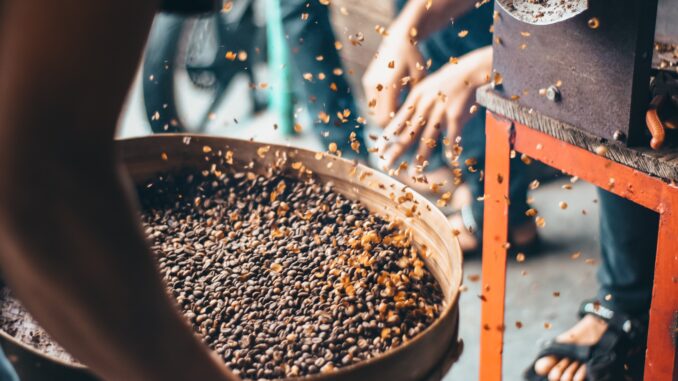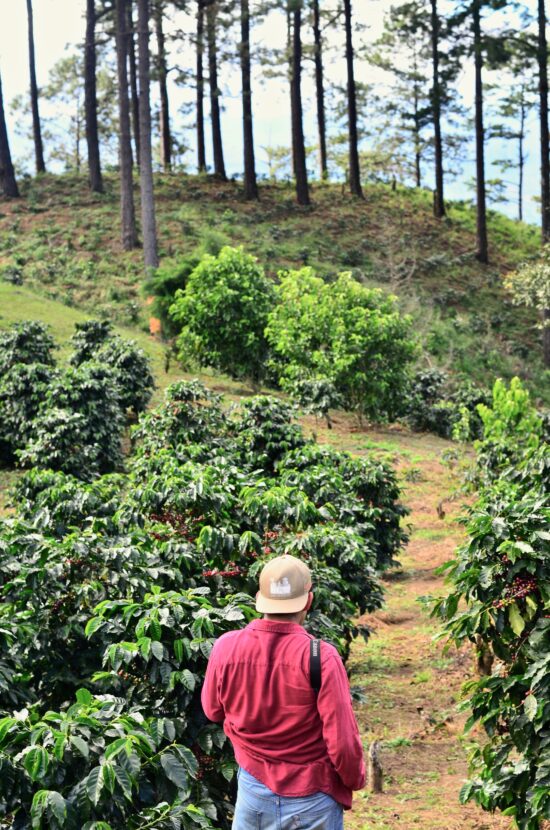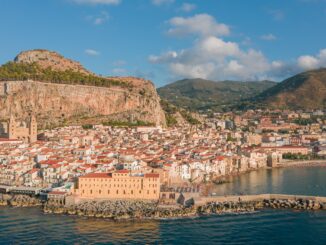
You don’t have to be invited on an origin trip to experience the hard work that goes into harvest season at a coffee farm.
BY TANYA NANETTI
SPECIAL TO BARISTA MAGAZINE ONLINE
Cover photo by Ardi Evans for Unsplash
When traveling to a country where coffee grows—whether it’s a widely known origin like Africa or Central America, or a lesser explored destination like Hawai’i or Cape Verde—many coffee lovers stop to visit a coffee farm.
But beyond that, there is also a different way to be involved in coffee production, meet farmers, and learn everything there is to know about coffee. That is through volunteering on a coffee farm.
Through volunteer or work-exchange websites, it is quite easy to find many fincas, farms, estates, and more that are looking for volunteers to help with daily activities, from nurturing coffee plants to harvesting them. Here are just a few of the coffee farms that await you.

Bwindi Forest Farm, Uganda
Bwindi Forest Farm is a coffee and livestock farm alongside the Bwindi Forest National Park in southwest Uganda. They employ 17 people from surrounding communities (10 of whom are women), and their work follows the ecological principles of permaculture: no chemical fertilizers, pesticides, and herbicides in the growth of coffee and other vegetables.
The coffee trees are shade-grown thanks to local trees, helping to create a dynamic that mimics the neighboring natural forest of the Bwindi Forest National Park.
Bwindi Forest Farm not only grows coffee, but also has a small animal farm and a campsite for sustainable tourism. Volunteers here can help in a wide range of fields. There’s help needed on the coffee farm, where you’ll learn all about organic coffee farming. Visitors can also develop sustainable camping through the creation of luxury huts, toilets, showers, terraces, hiking tracks, hideouts, and a swimming lake, all built using only local organic materials. More experienced volunteers can conduct field studies in biology to determine how biodiverse the Bwindi Forest Farm is.
Kedovo Coffee Project, Kenya
The Kedovo Coffee Project works in the communities of the Aberdares and Mt. Kenya mountains in central Kenya, helping their development through coffee production.
This area, thanks to rich volcanic soil and moderate rainfall, is famous for its aromatic and flavorful coffees that come mostly from small-scale farms.
These farms often face many challenges, from lack of sufficient production tools to a lack of transparency in the supply chain. All of these problems have led in recent years to a hard decision that many farmers have had to face: cutting down their coffee trees and, in many cases, replacing them with more profitable crops like corn and beans. This is where the Kedovo Coffee Project comes into play: helping local communities to continue growing coffee.
Kedovo volunteers teach how to increase coffee yield and help local communities avoid being exploited when selling coffee. They also help families get basic needs and more.
De Karanganjar, Indonesia
Opened in 1874 by a Dutch settler on the island of Java (Indonesia), De Karanganjar was born as a farm of robusta coffee and spicy cloves. After Indonesia’s independence, that farm was handed over to Denny Roeshadi, an independence veteran who had been a coffee farm employee for many years. From the ‘60s to today, the farm is still managed by the third generation of the Roeshadi family and is now open to the public.
It houses three museums, a café, and the historical coffee fields. Here, volunteers can help with various tasks, from looking after the coffee trees to taking care of the animals. Or, they can help with general maintenance to welcome tourists and guests of the farm.
Suan Lahu, Thailand
Suan Lahu Farm is a coffee producer that bonds the traditional culture of the Lahu people with the growing, processing, and roasting of arabica coffee in the northern highlands of Thailand. Suan Lahu raises awareness of the potential of eco-agriculture while helping local communities achieve sustainable livelihoods and become more environmentally conscious. They do this through a variety of internships and volunteering programs.
Here, volunteers will help Suan Lahu’s team with a variety of tasks, ranging from feeding the farm animals to grading, roasting and packaging the coffee, preparing and applying organic fertilizer and mulching, weeding, and grafting fruit crops, and even office-based internships.
Cafezal do Instituto Biológico, Brazil
Cafezal do Instituto Biológico isn’t a traditional farm, but it offers a more eccentric way of volunteering to help with the coffee harvest in Brazil. Known for its coffee history, São Paulo has a coffee farm right in the heart of the city. It is the largest urban coffee farm in the world that is located in the garden of the Instituto Biológico, with more than 1,500 plants of the Mundo Novo and Catuaí varieties.
It’s here in São Paulo that the Sabor da Colheita (Flavors of the Harvest) has been held since 2006, an event that symbolizes the beginning of the harvest in the whole state. Baristas, coffee farmers, representatives of cooperatives, and also simple coffee lovers meet here every year around May to volunteer in the harvesting of the coffee.
Participants have the opportunity to use traditional sieves and baskets; under the guidance of specialists, they will carry out selective harvesting only by hand, experiencing the work that has been driving the São Paulo economy for decades. With the aim of bringing a little of the farm routine to the metropolis, the coffee harvest has a good purpose: All coffee harvested during the event is processed and donated to the São Paulo Social Solidarity Fund.
ABOUT THE AUTHOR
Tanya Nanetti (she/her) is a specialty-coffee barista, a traveler, and a dreamer. When she’s not behind the coffee machine (or visiting some hidden corner of the world), she’s busy writing for Coffee Insurrection, a website about specialty coffee that she’s creating along with her boyfriend.




